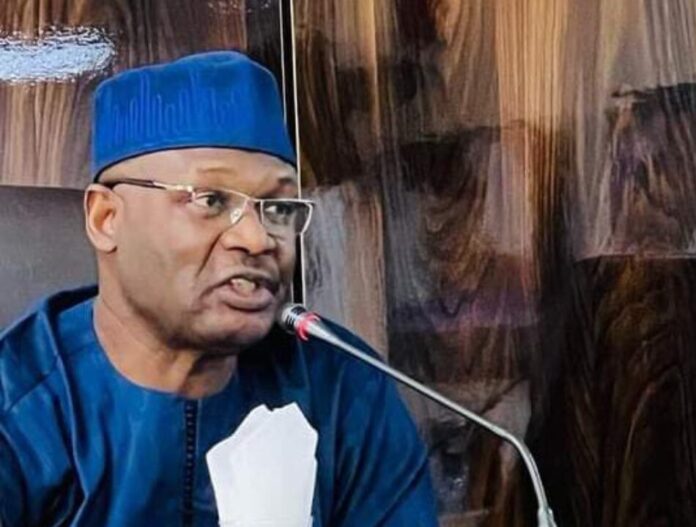Socio-Economic Rights and Accountability Project (SERAP) has filed a contempt lawsuit against Professor Mahmood Yakubu, Chairman of the Independent National Electoral Commission (INEC) “for failing to investigate the allegations of electoral offences committed during the 2023 general elections, identify suspected perpetrators and their sponsors, and ensure their effective prosecution.”
Justice Obiora Atuegwu Egwuatu of the Federal High Court, Abuja had on 18 July, 2024 ordered INEC “to pursue cases of bribery against state governors and their deputies, and other electoral offences committed during the 2023 general elections.”
Justice Egwuatu also ordered “INEC to seek the appointment of independent counsel to investigate allegations of electoral offences including bribery, vote-buying, conspiracy, and undue influence against state governors and their deputies during the 2023 general elections.”
However, INEC and Professor Yakubu have failed and/or refused to implement the judgment.
The Federal High Court, Abuja in the notice of consequences of disobedience to order of court warned Professor Yakubu that he would be “guilty of contempt of Court and liable to be committed to prison” if he fails “to obey the judgment orders.”
The notice, addressed to Professor Yakubu, read in part: “take notice that unless you obey the Orders contained in the Judgment of the 18th July 2024 made by Justice Egwuatu of the Federal High Court, Abuja in Suit Number: FHC/ABJ/CS/583/2023, a copy of which is hereto attached, you will be guilty of contempt of Court and will be liable to be committed to prison.”
In a statement dated 27 October 2024 and signed by SERAP deputy director Kolawole Oluwadare, the organisation said, “It’s unacceptable to take the court, which is the guardian of justice in this country, for a ride. A democratic state based on the rule of law cannot exist or function, if INEC and its chair routinely ignore and/or fail to abide by court orders.”
The statement, read in part: “Despite the service of the certified true copy of the judgment on INEC and Professor Yakubu, they have failed and/or refused to obey it.”
“The recurring cases of electoral bribery and violence make a mockery of Nigeria’s electoral process and participatory democracy. The latest allegations of electoral offences in Edo state show that INEC has learnt little or nothing from the well-documented problems during the 2023 general elections.”
“Ahead of the forthcoming governorship election in Ondo, INEC must turn the page on persistent electoral offences, end the impunity of perpetrators, and ensure citizens’ right to vote and political participation.”
Justice Egwuatu’s judgment, reads in part: “The substance of SERAP’s grouse is the violence associated with elections in Nigeria which tends to prevent citizens from exercising their franchise during elections, thus preventing credible election and in the long run credible leaders.”
“There is no gainsaying the fact that electoral violence and the associated crimes committed during elections in Nigeria is a great bane to the development of this Country both democratically and economically.”
“Being citizens of this great country, SERAP and its members have the legal interest whose enjoyment or enforcement directly or substantially depends on the performance of public duty by INEC.”
“In requesting the performance of the public duty imposed on the electoral body, SERAP has demonstrated a great zeal of patriotism.”
“There is no doubt that the Electoral Act 2022 created some electoral offences. Sections 123, 124, 125, 126 127, 128 and 129 are some of the provisions of the Electoral Act that created some specific electoral offences.”
“Trial of offences created by the Electoral Act are done in a Magistrate Court or a High Court of a State in which the offence is committed, or the Federal Capital Territory, Abuja. See Section 145(1) of the Electoral Act.”
“By section 145(2) of the same Act, prosecution for the offences shall be undertaken by legal officers of INEC or any legal practitioner appointed by INEC. Clearly therefore, the law imposes on INEC the performance of a public duty.”
“Section 24(d) and (e) of the Nigerian Constitution 1999 [as amended] recognizes the rights of citizens to take steps towards advancing the community where he resides.”
“The section provides that ‘it shall be the duty of every citizen to-(d) make positive and useful contribution to the advancement of progress and well-being of the community where he resides; (e) render assistance to appropriate and lawful agencies in the maintenance of law and order.”
Justice Egwuatu granted the following orders of mandamus against INEC (the Judgment Debtor):
AN ORDER OF MANDAMUS is hereby made directing and compelling INEC to seek the appointment of independent counsel to investigate allegations of electoral offences including bribery, vote-buying, conspiracy, and undue influence against state governors and their deputies during the 2023 general elections.
AN ORDER OF MANDAMUS is hereby made directing and compelling INEC to promptly, thoroughly and effectively investigate reports of electoral violence and other electoral offences committed during the 2023 general elections, identify suspected perpetrators and their sponsors, and ensure their effective prosecution.
AN ORDER OF MANDAMUS is hereby made directing and compelling INEC to swiftly, prosecute all arrested electoral offenders in the just concluded 2023 general election in the custody of the Nigeria Police Force, Economic and Financial Crimes Commission, Independent Corrupt Practices and Other Related Offences Commission and other law enforcement agencies.
It would be recalled that SERAP had on 20 July 2024 requested Professor Yakubu to “use his good offices and leadership position to immediately enforce the judgment ordering INEC to pursue cases of electoral offences including bribery against state governors and their deputies during the chaotic 2023 general elections.”
SERAP brought the contempt lawsuit against INEC and Professor Yakubu pursuant to section 72 of the Sheriff and Civil Process Act and Order IX, Rule 13 of the Judgment (Enforcement) Rules of Court.
No date has been fixed for the hearing of the contempt suit.







